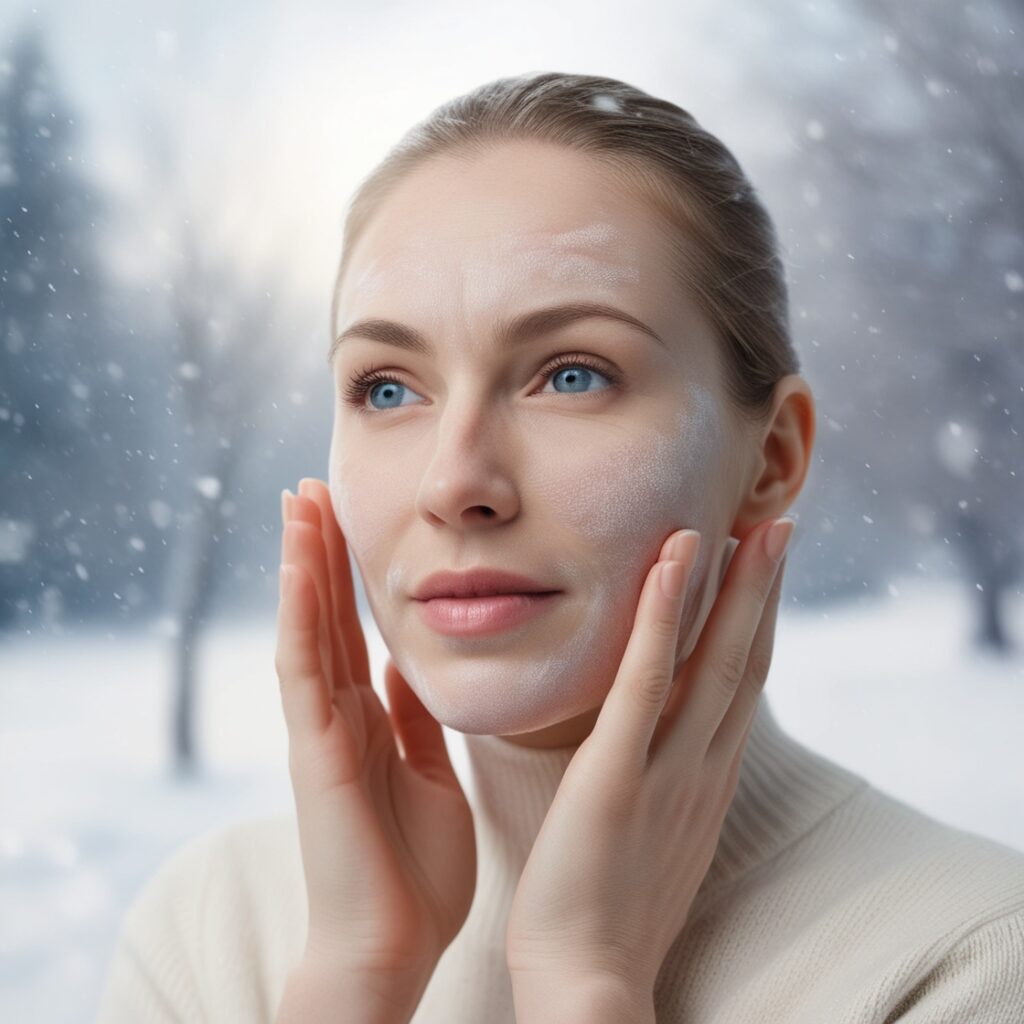Winter dry skin occurs when cold temperatures, low humidity, and indoor heating strip the skin of its natural moisture. This leads to dehydration, causing the skin to become rough, flaky, and sometimes even itchy or cracked. The lack of moisture in the air makes it harder for skin to retain hydration, leaving it feeling tight and uncomfortable. Just like a plant wilts without water, the skin needs extra care to stay nourished during these harsher months.
Here are some tips and Question solution for managing dry skin in winter:

★TIPS★
Use a Moisturizing Cleanser
Using a moisturizing cleanser is essential for dry skin, especially in winter. Unlike harsh soaps, these cleansers hydrate while gently removing dirt and impurities, preserving the skin’s natural oils. Look for formulas with ingredients like glycerin or ceramides to help maintain moisture balance and prevent further dryness.
Moisturize Immediately Af Moisturizer
Moisturizing immediately after bathing helps lock in moisture, as your skin is still damp and more receptive to hydration. Apply a thick, nourishing moisturizer within three minutes of stepping out of the shower to seal in water and prevent dryness. This simple step is especially important during winter, as it helps combat the skin’s natural tendency to lose moisture in cold, dry air.
Opt For Rich, Ointment-Based Moisturizers
During winter, opt for rich, ointment-based moisturizers to provide intense hydration and create a protective barrier against cold, dry air. These moisturizers are thicker than lotions, offering longer-lasting moisture retention. Look for ingredients like shea butter, cocoa butter, or petroleum jelly, which help lock in moisture, soothe dry patches, and prevent skin from becoming cracked or irritated due to harsh winter conditions.
Humidify Your Home
Using a humidifier in your home helps maintain moisture in the air, which is crucial during the winter when indoor heating can dry out the environment. This added humidity prevents your skin from losing moisture, keeping it hydrated and soft. A humidifier can also alleviate dry, itchy skin and help improve overall comfort during the colder months.
Avoid Hot Showers
Avoiding hot showers is important for preventing dry skin, especially in winter. Hot water can strip your skin of its natural oils, leading to dehydration and irritation. Instead, opt for lukewarm water and keep showers short to preserve your skin’s moisture. Afterward, immediately apply a moisturizing lotion or cream to lock in hydration and prevent the skin from becoming dry and tight.
Wear Protective Clothing
Wearing protective clothing in winter is essential to shield your skin from harsh weather conditions. Cold air and strong winds can quickly dry out and irritate exposed skin. Scarves, gloves, and hats help protect your face, hands, and other vulnerable areas from the elements. Choose fabrics like wool or soft cotton, which offer warmth without irritating the skin, ensuring your skin stays hydrated and comfortable during colder months.
Exfoliate Gently
Gently exfoliating once a week helps remove dead skin cells, allowing moisturizers to absorb more effectively. However, avoid harsh scrubs, which can irritate dry skin. Instead, opt for mild exfoliants with soothing ingredients like oatmeal or lactic acid. Over-exfoliating can damage the skin, so moderation is key.
Stay Hydrated
Staying hydrated is crucial for maintaining healthy skin, especially in winter. Cold air can dehydrate the skin, leading to dryness and irritation. Drinking plenty of water throughout the day helps maintain skin’s moisture balance from the inside out. Hydration also supports your skin’s natural barrier, making it more resilient against environmental stressors and preventing the tight, uncomfortable feeling often associated with dry winter skin.
Use Sunscreen
Even in winter, applying sunscreen is essential to protect your skin from harmful UV rays. Snow can reflect sunlight, increasing UV exposure, while the sun’s rays are still strong enough to cause damage, even on cloudy days. Use a broad-spectrum sunscreen with at least SPF 30 on exposed skin, such as your face, hands, and neck. Regular sun protection helps prevent premature aging, skin damage, and reduces the risk of skin cancer year-round.
By following these steps, you can help keep your skin hydrated and healthy through the winter months.

★QUESTION SOLUTION★
1. What Does Dry Skin Look Like?
Dry skin often appears rough, flaky, and dull, with visible dry patches or fine lines. It may feel tight or itchy, especially after washing. In more severe cases, it can crack, peel, or become red and irritated. The skin may also show signs of inflammation or redness, particularly on sensitive areas like the face, hands, and elbows, due to lack of moisture and natural oils.
2. What Causes Dry Skin In Winter?
Dry skin in winter is caused by a combination of cold temperatures, low humidity, and indoor heating. These factors strip the skin of its natural moisture, leaving it dehydrated and prone to irritation. The reduced humidity in winter air makes it harder for skin to retain moisture, leading to dryness, tightness, and flakiness.
3. What Is The Best Cleanser For Dry Skin?
The best cleanser for dry skin is one that hydrates while gently removing impurities without stripping natural oils. Look for cream-based, hydrating cleansers with ingredients like glycerin, hyaluronic acid, or ceramides. These help maintain moisture balance and soothe dry skin. Avoid foaming or gel cleansers, as they can be too harsh and drying, and opt for fragrance-free formulas to prevent irritation.
4. What Is The Dermatologist Recommended Sunscreen?
Dermatologists often recommend broad-spectrum sunscreens with SPF 30 or higher for optimal protection against UVA and UVB rays. Look for sunscreens that are water-resistant, non-comedogenic, and suitable for your skin type. Some popular dermatologist-recommended brands include EltaMD, La Roche-Posay, Neutrogena, and CeraVe, which offer gentle, effective formulas that protect against sun damage without causing irritation or clogging pores. Always choose a sunscreen based on your specific needs.
5. Why Is Moisture So Important For The Winter Dry Skin?
Moisture is crucial for winter dry skin because cold air and indoor heating strip the skin of its natural hydration. Without moisture, the skin becomes dry, flaky, and prone to irritation. Properly moisturizing helps restore the skin’s natural barrier, preventing dehydration and keeping it soft and smooth. It also enhances the skin’s ability to retain water, making it more resilient to harsh winter conditions and reducing discomfort caused by tight, dry skin.
6. What Is The Best Moisturizer For Winter Dry Skin?
The best moisturizer for winter dry skin is one that provides deep hydration and creates a barrier to lock in moisture. Look for thick, ointment-based formulas with ingredients like shea butter, ceramides, hyaluronic acid, and glycerin. Products such as CeraVe Moisturizing Cream, Vanicream Moisturizing Cream, and Neutrogena Hydro Boost are excellent options. These help replenish moisture, soothe dryness, and protect the skin from harsh winter conditions, keeping it soft and nourished.
7. How Can You Prevent Dry Skin In The Winter Months?
To prevent dry skin in winter, start by using a gentle, hydrating cleanser and applying a rich moisturizer immediately after bathing. Keep showers short and use lukewarm water to avoid stripping natural oils. Use a humidifier indoors to add moisture to the air and drink plenty of water to stay hydrated. Wear protective clothing like scarves and gloves to shield your skin from the cold. Finally, exfoliate gently to remove dead skin cells, allowing moisturizers to absorb better.
8. Will A Humidifier Help With Dry Skin In The Winter?
Yes, a humidifier can help with dry skin in the winter by adding moisture to the air. During cold months, indoor heating reduces humidity, which can strip the skin of its natural moisture. Using a humidifier helps maintain optimal moisture levels in the air, preventing skin from becoming excessively dry, irritated, or cracked, and promoting overall hydration and comfort.
Join our community! Subscribe to receive updates on [shinewithyou.com]. Don’t forget to share your thoughts and ideas in the comments section below each post. Your feedback will motivate me to provide more new hair and skin care solutions, remedies, and tips Thank you.
